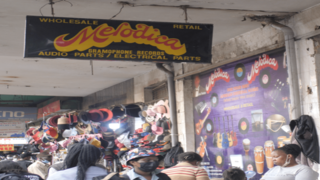
The entrance to Melodica music store along Tom Mboya Street in Nairobi.
| Victor Odhiambo | Nation Media GroupNews
Premium
Melodica, one of Kenya’s last record stores, sticks out in changing sphere
What you need to know:
- You will be hard-pressed to find a person as zealous about what they do as Abdul Karim, the proprietor of Melodica.
- Karim inherited the shop from his father, Daudia Pravinal, who opened his first music store in 1952.
As you walk on Tom Mboya Street, one of the oldest streets in Nairobi, you will unquestionably notice crowds of pedestrians and shoppers on the busy pavements. The noise of matatus and taxis hooting is deafening.
Nonetheless, as you attempt to escape the hustle and bustle of the busy street, you will undoubtedly catch sight of a vintage record store going by the name of Melodica exhibiting all manner of antique musical equipment.
As you walk into the store, some seraphic classical music fills the air without effort, like the waves filling holes in beach sand.
I perceptibly recall my extemporaneous visit to Melodica stores. On that day, they were playing one of my most treasured songs, “Binadamu Simile” by the legendary Mohammed Mazingazinga Mjato of the celebrated Orchestre Les Volcano.
The lyrics swam through my cerebral cortex like a wakeful dream, the notes relaxing me, enabling the song to call to my entire being.
You will be hard-pressed to find a person as zealous about what they do as Abdul Karim, the proprietor of Melodica. Upon meeting him, you will notice a certain look about him, the look of a life well-lived, one where passion and love for music took a front seat in both challenging and good times.
The map of wrinkles on his face told of the most incredible journey. His eye lines told of laughter, of warm smiles and affection.

Abdul Karim, the proprietor of Melodica music store displays some of the music equipment on sale at the shop.
Karim inherited the shop from his father, Daudia Pravinal, who opened his first music store in 1952.
Melodica was then established in 1971. Karim took over the store in 1982 after his father's death in 1981. Now, 40 years later, Melodica is a cornerstone for East and Central African music, encompassing a publisher, a record shop and multiple record labels.
"My father started Melodica in 1971. Music has always been inside our life. He used to import records because Kenya didn't have a pressing company," said Karim.

Abdul Karim (right), the proprietor of Melodica music store, with two of his employees at the shop.
Since its birth in 1971, he said, Melodica was the leading producer of vinyl in the region, until pressing companies were phased out in the late '80s. Still, in that time, Melodica produced absolute gems - Sulwe, Zigo, Bondo, Bana Ngenge, Kakuta, Lipua Lipua, Sosoliso and many more.
Melodica boasts an Aladdin’s cave of records from the 1950s to 1990s.
"We had so many labels from the '50s that I can't even count," says Karim.

Abdul Karim (right), the proprietor of Melodica music store with the late Kenyan musician Daudi Kabaka.
Karim admits that the digital disruption and the closure of many pressing companies are the challenges facing the vinyl culture. However, with the resurgence of the vinyl format, the heyday of record shopping doesn't seem too far away.
"There is a resurgence of vinyl format orders, which indicates that the culture is still alive though not how it used to be in the past. As Melodica, we have had to adapt to this digital disruption by repurposing and digitising the record labels and selling them online for as little as Sh100," Karim says.

Daudia Pravinal (second right), the founder of Melodica music store, presents a proposal for the formation of a music copyright body to President Jomo Kenyatta.
Despite the resurgence of the vinyl format orders, Karim calls for intellectual property enforcement for the record labels. He laments that the government is not doing enough to ensure that the rights of these legendary musicians are upheld.
"People are buying the record labels from our stores, they digitise them and then upload them on streaming platforms like YouTube and claim to be theirs. For me, that is total theft and action needs to be taken. Homage needs to be paid to these artistes for their incredible work," he says.
Additional reporting by Valery Soy




